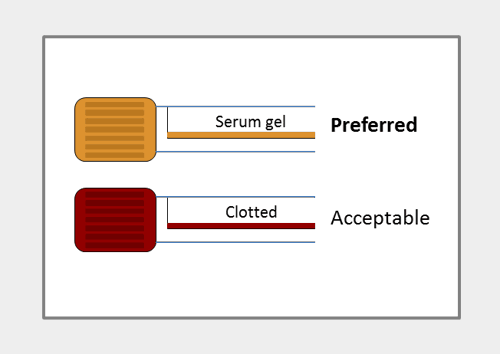Testosterone
| About This Test |
|
Department: Biochemistry Requirement:
Add-on requests are accepted up to 48 hours post sampling
Turnaround Time: Within 24 hours |
Background:
Investigation of: early/delayed puberty in boys; low libido, erectile dysfunction and infertility in males; hirsutism, virilisation and infertility in females; and adrenal/pituitary/hypothalamic disorders in both males and females.
Testosterone measurements in males should be performed at 9 am, following an overnight fast. Avoid measurement in men recovering from acute illness, or using short term medications which suppress testosterone concentration. In males with low testosterone, FSH/LH measurements may differentiate between primary and secondary testicular failure. Further endocrine testing, e.g. cortisol, thyroid function, prolactin may be useful, and may be added by the Duty Biochemist if considered appropriate.
In females, samples with elevated testosterone concentrations will be referred for further analysis by a more specific method - see Testosterone (referred). If female patients are taking medications/supplements which may affect testosterone, please state this in the clinical details.
Reference ranges:
| Age range | Reference range (nmol/L) | |
|---|---|---|
| < 10 years | 0 - 1 | |
| Adults | Females <50 years | 0.29 – 1.21 |
| Females ≥50 years | 0.0 – 1.25 | |
| Males <50 years | 6.85 - 23.23 | |
| Males ≥50 years | 6.51 - 23.74 | |
These reference ranges were implemented on the 9/12/21
Results outside the reference range do not necessarily indicate disease. Similarly, results within the reference range do not preclude abnormality. Please contact the Duty Biochemist for discussion of individual patient results.
Other Comments:
For more information, please see the following: Testosterone - Lab Tests Online
Content approved in Clinical Biochemists meeting 13.12.18
See also: Testosterone (referred)

